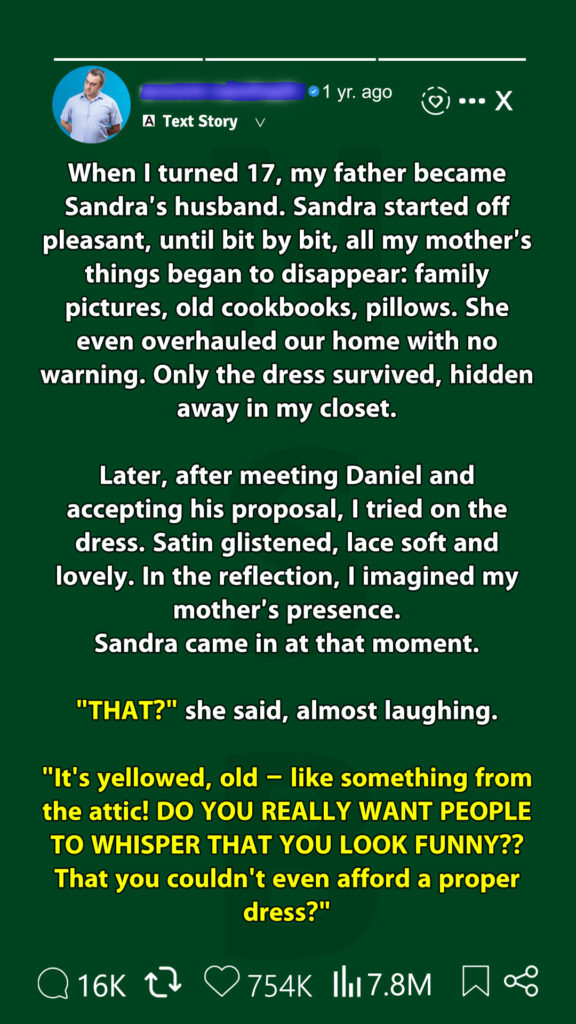I was fourteen when I lost my mother. One week she was humming in the kitchen, braiding my hair before school. The next, she was gone—taken by cancer so swiftly it felt like the world had skipped a beat and never recovered.
Her absence hollowed the house. But her presence lingered in the details: the scent of her perfume on the curtains, her handwriting on recipe cards, the soft hum of her laugh echoing in photo frames. I clung to those fragments like lifelines.
One afternoon, I opened her closet. I ran my fingers over her dresses, slid her rings onto my fingers, and then found it—her wedding gown. Satin and lace, zipped into a garment bag, tucked behind coats like a secret. I pressed it to my chest and made a promise: when I get married, I’ll wear this. I’ll carry her with me down the aisle.

It wasn’t her dying wish. It was mine.
Three years later, my father remarried. Sandra came into our lives with soft smiles and lavender candles. She wasn’t cruel—at first. But slowly, she began erasing my mother. A photo disappeared from the mantel. Her favorite mug vanished from the kitchen. Her memory was being scrubbed from the house like a stain.
I asked about the missing things. Sandra said they were “clutter.” My father stayed silent.
I kept my promise quietly. I never told Sandra about the dress. I kept it hidden, tucked away, waiting for the day I’d wear it.
That day came.
I was twenty-five, engaged to the love of my life. We planned a small wedding in the garden my mother once tended. I told my father I’d be wearing her dress. He smiled, eyes misty, and said, “She’d be proud.”
The morning of the wedding, I went to retrieve the gown.
It was gone.
I tore through the closet, the attic, every drawer. Nothing. I asked Sandra. She shrugged. “It was old. Yellowing. I threw it out.”
I couldn’t breathe.
I collapsed onto the floor, sobbing. My mother’s dress wasn’t just fabric—it was memory. It was love. It was the only part of her I could carry into this new chapter.
My father found me. I told him what happened. His face darkened. He didn’t speak. He just walked out the door.
An hour later, he returned—with a garment bag in hand.
Our neighbor, Mrs. Langley, had seen Sandra toss the dress into a donation bin. She’d rescued it, knowing how much it meant to me. My father had gone straight to her, desperate.
He handed me the bag. “She tried to erase your mother. But she didn’t succeed.”
I wore the dress.
It fit like memory. Like love. Like home.
Sandra didn’t attend the ceremony. My father didn’t ask her to.
That day, I didn’t just marry the man I loved—I reclaimed my mother’s legacy. And my father, after years of silence, finally chose to protect it.


